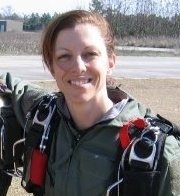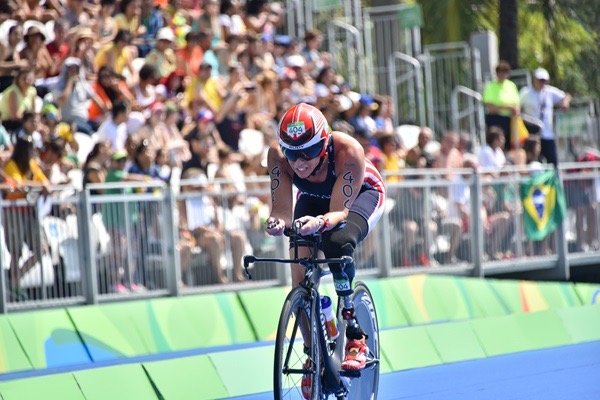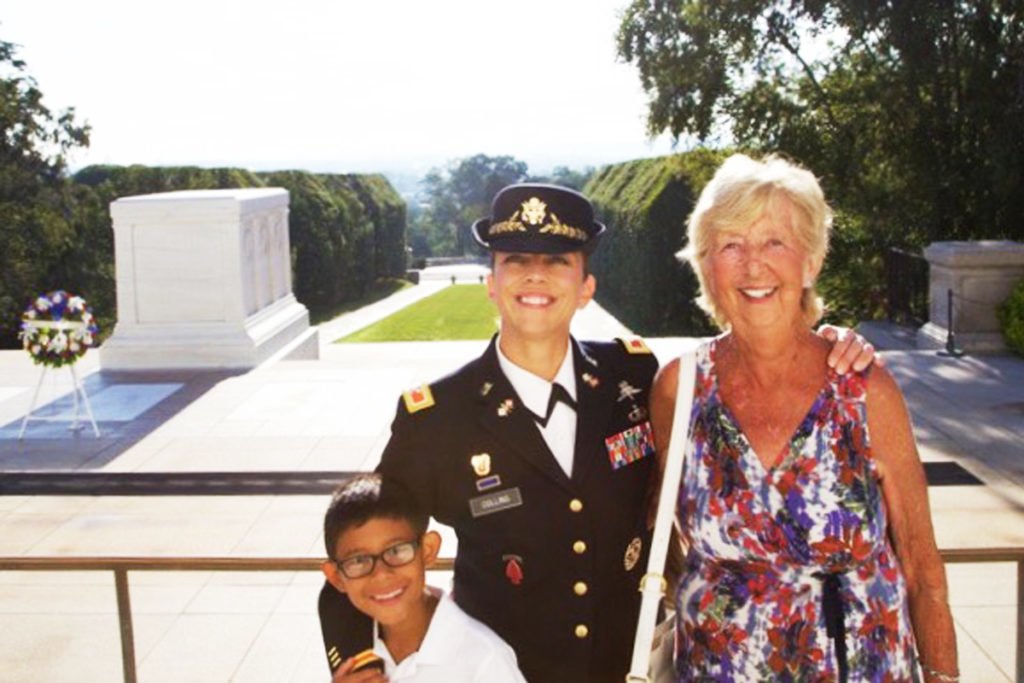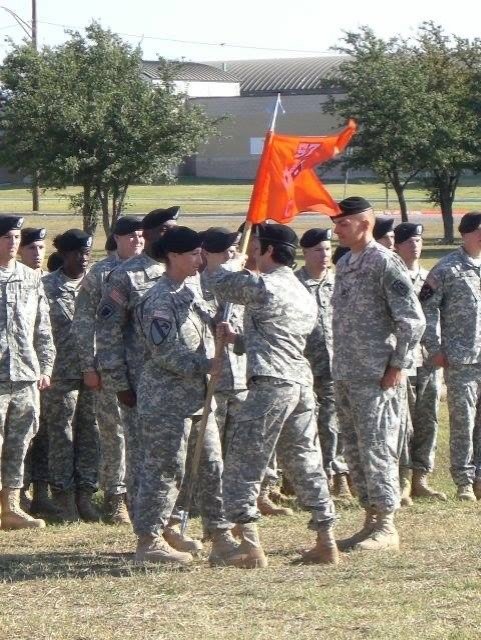Special Operations Veteran, Elite Athlete Patty Collins on Life After Losing Her Leg
For many soldiers and athletes, losing a leg would be the absolute worst thing that could ever happen to them.
But retired Army Colonel Patty Collins chooses to look on the bright side.
After all, it didn’t stop her from jumping out of airplanes and deploying with her unit to Afghanistan. And if she hadn’t gotten hit by a car while riding her bicycle to work in July 2006, fractured her leg and had it amputated a short time later, she would never have competed as a triathlete in the 2016 Summer Paralympics or gone mountain biking in Texas with a group of injured veterans led by President George W. Bush.

“There’s tons of blessings that came from that,” she said.
Collins, 50, recounted these experiences during a recent interview at her home in Alexandria, Virginia, where her work-from-home civilian job, 13-year-old son, and three big rescue dogs are keeping her busy in her post-military retirement days.
She also coaches adaptive sports for veterans and volunteers as a sighted guide on tandem bikes for people with visual impairments.
“I think one of the other positive things that came from becoming someone with a disability is now your eyes are open to other people with disabilities and how can you help them have the same opportunities that you have,” she said.
“She’s extremely humble, extremely unassuming,” said retired Army Colonel Keith Pellegrini.
Collins’ positivity isn’t forced or rehearsed. And the way she talks, so familiar and easy going, it’s easy to forget she’s a decorated soldier whose military record shows more than two dozen badges, medals, and other accomplishments, as well as an elite athlete. As old Army friends confirmed, she’s as genuine and “down to earth” as they come.
“She’s extremely humble, extremely unassuming,” said retired Army Colonel Keith Pellegrini, who worked with Collins at Fort Bragg in North Carolina as well as in her first civilian job at the McChrystal Group.
He said in conversations with clients of the consulting firm, Collins would mention that she had spent a long time in the Army and had taken some time off after retirement — leaving out that she had achieved the rank of colonel and spent her break from work training and competing in the Paralympics.
“I’d be like, ‘Sorry, let me give you the rest of the story,’” Pellegrini said.

‘All in’
That story starts at Rutgers University, where Collins enrolled in 1987 after receiving an ROTC scholarship.
“You want to say, ‘Oh, I joined [the military] because I was patriotic,’ and all those apple pie things,” Collins said. “I joined for free college, honestly.”
By the end of her first semester, however, she was hooked.
“I’m all in,” she remembered telling her parents after bonding with the other cadets and getting a taste of what Army life would be like. “You couldn’t talk me out of it at that point.”
Not even after her sophomore year when she was competing to be the class honor graduate from Airborne School and a noncommissioned officer, or “Black Hat,” told her they weren’t ready for a female honor graduate.
Collins said she had many interesting opportunities in her 24-year Army career that she never would’ve thought women had the opportunity to do, such as going to military freefall school and serving in Delta Force
“I said, ‘Okay,’ and I turned around and I went back to formation,” Collins said. “And, honestly, it took me several years, and I kind of replay that conversation in my mind and I was like, ‘That was really inappropriate and really wrong.’ But I think that we were still coming out of that phase of you just accepted things like that and you knew they were wrong but you weren’t going to rock a boat, right?”
But despite that experience and a few other bouts with discrimination or sexually inappropriate comments in her younger years, Collins said she had many interesting opportunities in her 24-year Army career that she never would’ve thought women had the opportunity to do, such as going to military freefall school and serving in Delta Force. She also served with units that valued input from all involved, regardless of gender or even rank.
Around her eighth year in the Army, she knew it would be her career. And as she got older and grew more confident, people knew not to mess with the “smart-mouth Italian girl from Jersey.”

A life changing accident
In the summer of 2006, Collins was assigned to Delta Force. She had just come back from a deployment to Iraq and was selected for a promotion to lieutenant colonel.
“I was at a moment in my life when I was not shy on self-confidence,” she said. “I was feeling pretty good about me.”
Someone sent her an email congratulating her on making the promotion list and also included a warning: They’d heard she was riding her bike to work on a busy, dangerous street on Fort Bragg and said she could get hit by a car if she kept it up.
Later that weekend, she made light of that message when talking to a fellow cyclist. Twenty-four hours later, she was lying on the side of the road with an exposed compound tibia/fibula fracture in her left leg, meaning “both bones were broken, and they were sticking out the back of my calf,” she explained.
But when a doctor told her she’d never walk again without pain and that she would eventually beg him to fuse her ankle, she said she’d rather have him cut it off.
So, she did.

No regrets
Pellegrini remembers seeing Collins on crutches when she went back to work two weeks after the accident, then again several months later when he returned from a deployment.
When he asked for an update, she told him she was having her leg amputated the next day.
“I literally was stopped dead in my tracks, and I was like, ‘Holy shit!’” he said. And when he heard the backstory — that she’d be lucky to walk, run, or ride her bike if she didn’t — Pellegrini was dumbfounded. “She said, ‘That’s not who I am. I couldn’t be the person that I knew I could be, should be, and wanted and needed to be.’”
Pellegrini said he was so moved that he went home and wrote her a letter expressing his admiration and respect — “and a hope, honestly, that if I ever found myself in a situation similar to that, God help me, that I would have the same strength of character and conviction to take the same type of action.”
It wasn’t a decision Collins made lightly. In the aftermath of the accident, she was dealing with deep depression and seeking help for the toll the injury had taken on her mind, as well as her body.
“In the deep pit of depression, I remember thinking, ‘I want to go to sleep and wake up when this ends,’ because I didn’t know where this ended, and I couldn’t see a path out that was positive,” she said. “I would not say I was suicidal, but I definitely was in a place of despair.”
It helped that she worked with four amputees who had gone through similar operations. They gave her an idea of what life would be like without her leg and reassurance that there was, indeed, a light at the end of the tunnel.
“What it turned out to me was what do you want out of your life, and what are you willing to do to get that back? And I wanted my physical mobility back,” Collins said.
She had another good reason to be mobile: Collins and her then-husband were in the process of adopting a baby from Guatemala, and she wanted to be able to keep up when he arrived.
So, in May 2007, Collins elected to have her leg amputated below the knee. She hasn’t regretted it a single day since.
“You have to take time to mourn your situation, whether it’s a wound or whatever, kind of let go of the life you previously had, but that life is by no means over or unfulfilling. There’s a lot of joy in your new normal.”
A better leader
Collins is thankful for all of those negative experiences — the accident, the amputation, and even the depression — because they helped her become a better leader. Her prosthesis became a visible sign that she had been through hard times, so soldiers turned to her as a confidant. She became more aware of other people’s unseen struggles and empathetic to their hardships.
Army Major Jessica Dawson said that made a big difference in her life when she served under Collins at Fort Hood from 2010 to 2011. For starters, Dawson had a bad back that made it hard to run and do certain physical activities, yet when she interviewed with Collins, it wasn’t an issue; her superior merely pushed her to explain how that changed how she led.
Then there was the time that Dawson’s daughter fell from a bunk bed and was in intensive care at the hospital, then at home for a month before she could return to daycare. Collins offered Dawson flexibility during that time and even allowed her to bring her daughter to meetings, if necessary, so Dawson could keep her command position.

“She never once questioned my ability to lead effectively and take care of my family, and that, I think, is the thing that stands out to me the most,” said Dawson, now an assistant professor at the United States Military Academy in West Point, New York. “I don’t think I would be in the Army today if she hadn’t reacted like that.”
“Everyone has challenges in their life and some you can see and some you can’t see, but everyone deserves an opportunity to have their challenges heard or dealt with or accepted,” Collins said. “I thought about times when I was not necessarily nice. If I thought someone was not a great performer or not a particularly nice person, it was very easy to think that they were a variety of negative things, instead of saying like, ‘Hey, how are you? You’ve been different lately’ or ‘What’s going on with you?’”
And that’s the biggest lesson she wants to leave others with — even now as she leads from the sidelines as a community volunteer, including as an advocate for bike lanes in her hometown.
“We all have an unpredictable future in life. You’re promised nothing. You have to take time to mourn your situation, whether it’s a wound or whatever, kind of let go of the life you previously had, but that life is by no means over or unfulfilling,” she said. “There’s a lot of joy in your new normal.”

BRCC and Bad Moon Print Press team up for an exclusive, limited-edition T-shirt design!
BRCC partners with Team Room Design for an exclusive T-shirt release!
Thirty Seconds Out has partnered with BRCC for an exclusive shirt design invoking the God of Winter.
Lucas O'Hara of Grizzly Forge has teamed up with BRCC for a badass, exclusive Shirt Club T-shirt design featuring his most popular knife and tiomahawk.
Coffee or Die sits down with one of the graphic designers behind Black Rifle Coffee's signature look and vibe.
Biden will award the Medal of Honor to a Vietnam War Army helicopter pilot who risked his life to save a reconnaissance team from almost certain death.
Ever wonder how much Jack Mandaville would f*ck sh*t up if he went back in time? The American Revolution didn't even see him coming.
A nearly 200-year-old West Point time capsule that at first appeared to yield little more than dust contains hidden treasure, the US Military Academy said.












